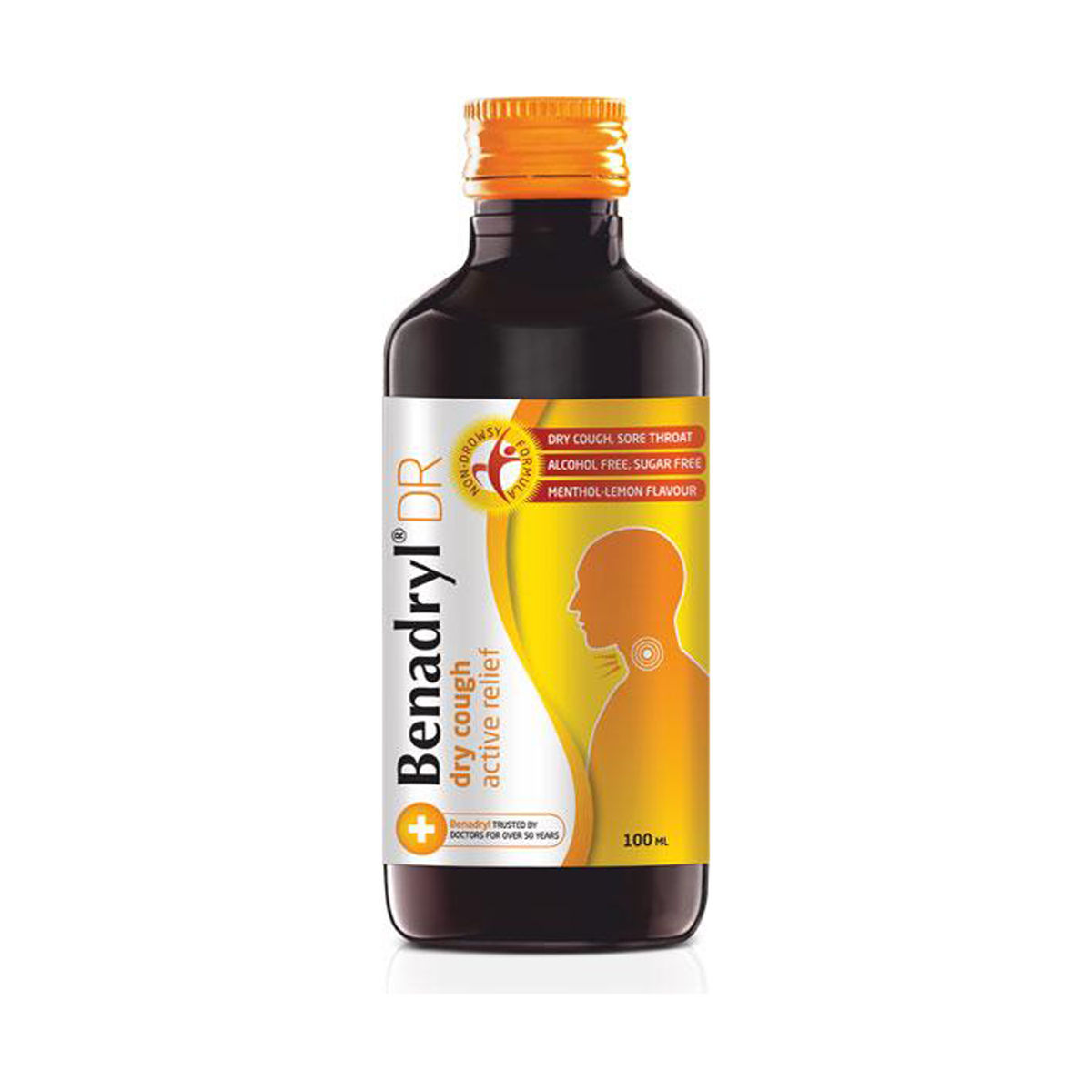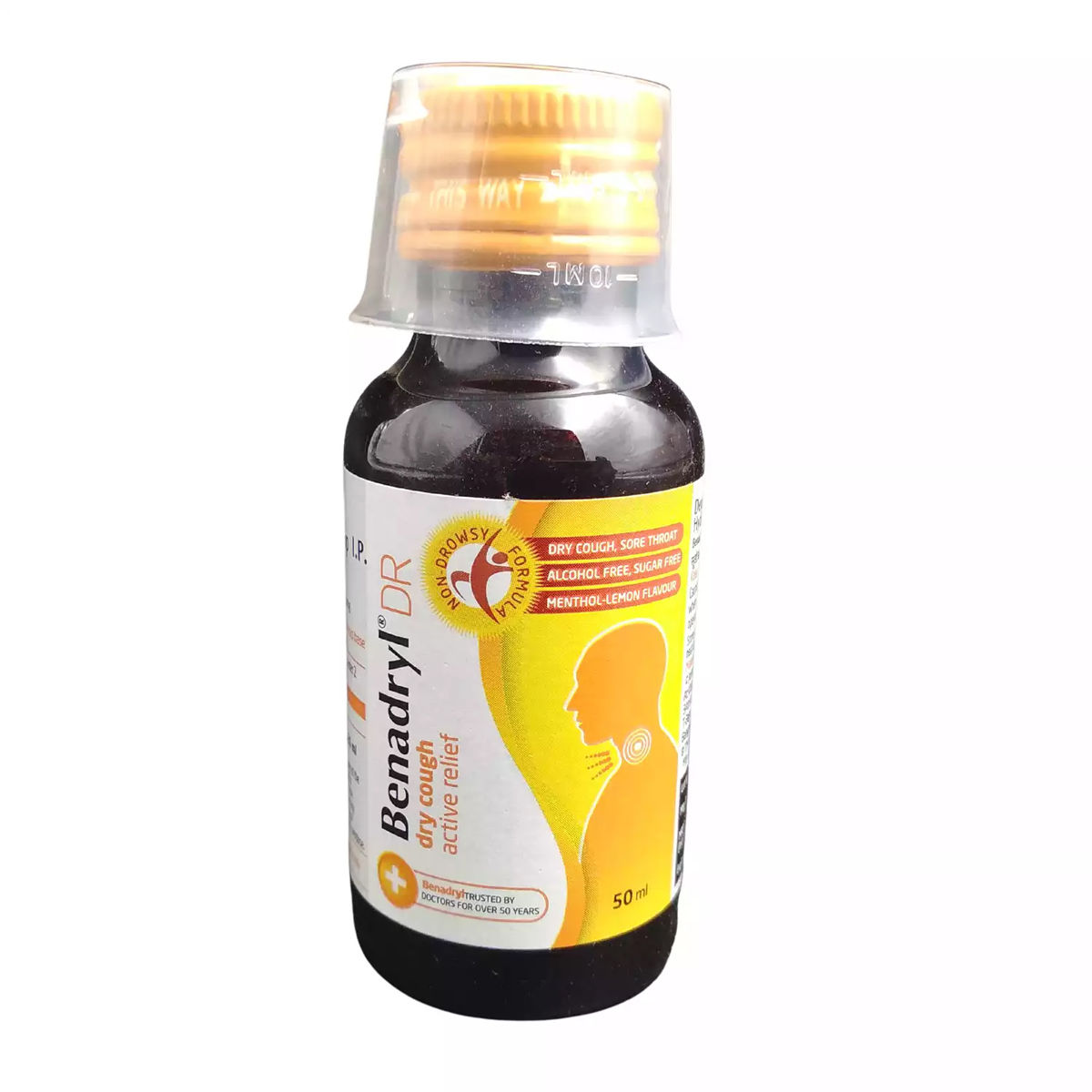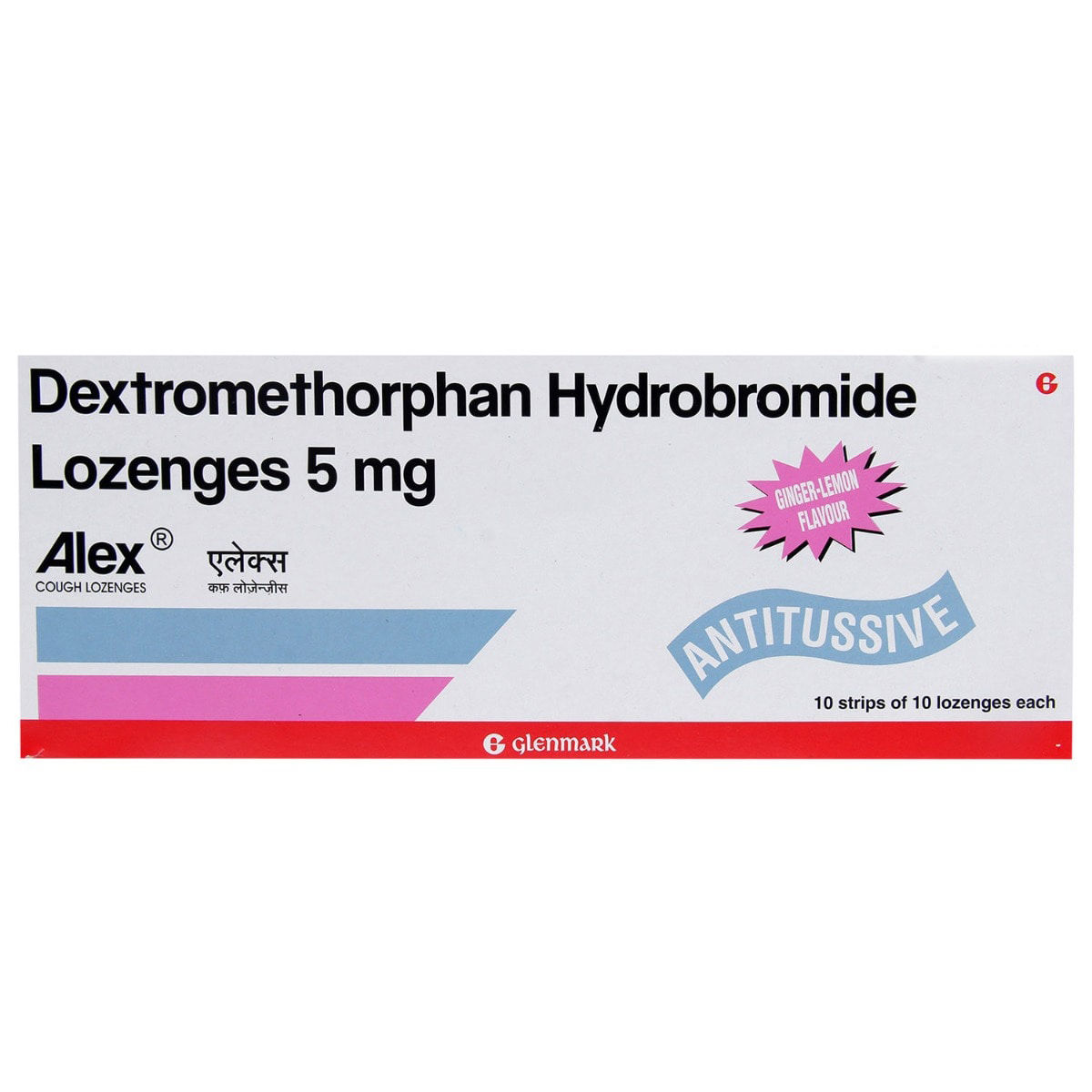Dextromethorphan Hydrobromide
About Dextromethorphan Hydrobromide
Dextromethorphan Hydrobromide belongs to a class of medicines called antitussives, which are used to treat a dry cough. Coughing is a natural reflex that helps remove irritants like allergens, mucus, or smoke from the airways and prevents infections. Coughs are categorised as dry or wet. A dry cough is irritating and does not produce mucus, whereas a wet cough generates mucus or phlegm, which helps clear the airways, typically due to infections or irritation.
Dextromethorphan Hydrobromide contains Dextromethorphan hydrobromide, a cough suppressant. It works by blocking the cough receptor present in the brain, which is known to cause cough.
The most common side effects of Dextromethorphan Hydrobromide are dizziness, drowsiness, sleepiness, confusion, and nausea. Most of these side effects do not require medical attention and typically resolve on their own over time. However, if the side effects persist or worsen, please consult your doctor.
Inform your doctor if you are allergic to Dextromethorphan Hydrobromide or any other medication. If you are pregnant or breastfeeding, please inform your doctor before starting Dextromethorphan Hydrobromide. Dextromethorphan Hydrobromide should be given to children only if prescribed by the doctor. Dextromethorphan Hydrobromide may cause drowsiness, so drive with caution. Let your doctor know if you are taking any prescription/non-prescription drugs or herbal products before starting Dextromethorphan Hydrobromide.
Uses of Dextromethorphan Hydrobromide
• Relief from dry cough: Dextromethorphan Hydrobromide provides temporary relief from dry cough caused by allergic reactions or irritants in the air.
• Soothing an irritated throat: Dextromethorphan Hydrobromide helps to soothe the throat and reduce the urge to cough, allowing for better sleep during nighttime cough episodes.
• Cough suppressant: Dextromethorphan Hydrobromide helps ease symptoms of dry, non-productive coughs caused by colds or environmental irritants like smoke, dust, or pollutants.
• Antihistamine benefits: Dextromethorphan Hydrobromide acts as an antihistamine to alleviate coughing due to upper respiratory tract allergies.
Medicinal Benefits
Dextromethorphan Hydrobromide is primarily used to treat a dry cough. Dextromethorphan Hydrobromide contains Dextromethorphan hydrobromide, a cough suppressant. It works by blocking the cough receptor present in the brain, which is known to cause cough.
Directions for Use
- Dextromethorphan Hydrobromide can be taken with or without food.
- Follow your doctor's instructions on the dosage and timing of this medication.
- Swallow Dextromethorphan Hydrobromide as a whole with a glass of water.
- Do not crush, break, or chew it.
Storage
Side Effects of Dextromethorphan Hydrobromide
- Dizziness
- Drowsiness
- Diarrhoea
- Sleepiness
- Confusion
- Nausea
Drug Warnings
Do not take Dextromethorphan Hydrobromide if you are allergic to any of the contents. If you are pregnant or breastfeeding, please inform your doctor before starting Dextromethorphan Hydrobromide. If your condition does not improve or you have a recurring cough with fever, rash, please visit the doctor immediately, as this could be serious. Dextromethorphan Hydrobromide should be taken at least 15 days after the last dose of anti-depressants, especially monoamine oxidase inhibitors (MAO), as taking both together may be fatal.
Drug Interactions
Drug-Drug Interaction: Inform the doctor if you are taking MAO inhibitor (isocarboxazid, phenelzine, rasagiline, selegiline, tranylcypromine), anti-arrhythmic medications (amiodarone, propafenone, quinidine and flecainide), opioid analgesics (codeine, tramadol, morphine, methadone), anti-anxiety medications (fluoxetine, paroxetine, sertraline) and anti-fungal (terbinafine).
Drug-Food Interaction: No interactions found/established.
Drug-Disease Interaction: If you have lung disease, depression, or anxiety, inform your doctor before taking Dextromethorphan Hydrobromide.
Drug-Drug Interactions Checker List:
Safety Advice

Alcohol
unsafeAvoid consumption of alcohol with Dextromethorphan Hydrobromide as it may cause increased drowsiness. Please consult a doctor before consuming alcohol with Dextromethorphan Hydrobromide.

Pregnancy
cautionDextromethorphan Hydrobromide belongs to pregnancy category C. Its safety in pregnancy is unknown, so it should be taken only if prescribed by a doctor.

Breast Feeding
cautionThe safety of Dextromethorphan Hydrobromide in breastfeeding women is unknown, so it should be taken only if prescribed by a doctor.

Driving
cautionDextromethorphan Hydrobromide may cause drowsiness or tiredness in some people. Therefore, drive only if you are alert after taking Dextromethorphan Hydrobromide.

Liver
cautionTake Dextromethorphan Hydrobromide with caution, especially if you have a history of liver disease. The dose may be adjusted by your doctor as required.

Kidney
cautionTake Dextromethorphan Hydrobromide with caution, especially if you have a history of kidney disease. The dose may be adjusted by your doctor as required.

Children
cautionDextromethorphan Hydrobromide is not recommended for children below the age of 4. Dextromethorphan Hydrobromide should be given to children only if prescribed by a child specialist.
Habit Forming
Diet & Lifestyle Advise
- Wash your hands with soap and water regularly to prevent the spread of germs.
- Eat plenty of foods rich in good bacteria, like yoghurt, to improve overall health.
- Drink plenty of fluids to avoid dehydration.
- Gargle with salt water for relief from a sore throat.
- Do not smoke, as it might worsen your symptoms.
- Avoid alcohol consumption as it may cause tiredness, drowsiness, or lack of concentration.
Special Advise
- Do not use dextromethorphan if you have used an MAO inhibitor (isocarboxazid, phenelzine, rasagiline, selegiline, tranylcypromine or methylene blue injection) within the past 14 days.
Patients Concern
Disease/Condition Glossary
Dry cough: It is a reflex action that helps to clear any foreign irritant or mucus in the throat. Mostly, a cough lasts for a short time (two to three weeks), so it is acute. But sometimes, if it is persistent for more than eight weeks, it can lead to a chronic cough. The most common causes of cough are cold/flu, asthma, emphysema, and COPD (chronic obstructive pulmonary disease).
FAQs
Dextromethorphan Hydrobromide is used to relieve a dry cough caused by cold, flu, or throat irritation.
Dextromethorphan Hydrobromide works by blocking the cough receptor present in the brain, which is known to cause cough.
To treat your condition effectually, continue taking Dextromethorphan Hydrobromide for as long as your doctor has prescribed. Do not be reluctant to speak with your doctor if your condition does not improve or if you experience any difficulty whilst taking Dextromethorphan Hydrobromide.
Dextromethorphan Hydrobromide may cause drowsiness. So, operating any machinery or driving a car, doing an activity that requires concentration and alertness, should be avoided unless you are alert.
Dextromethorphan Hydrobromide can have addictive effects if taken in more than the recommended dose. Hence, take Dextromethorphan Hydrobromide only as prescribed.
It is not recommended to take Dextromethorphan Hydrobromide along with any antidepressant medication as it can lead to unpleasant side effects or drug interactions. Also, Dextromethorphan Hydrobromide should be taken at least 15 days after your last dose of anti-depressants, especially monoamine oxidase inhibitors (MAO).
Dextromethorphan Hydrobromide may cause drowsiness/sleepiness. Hence, drive or operate machinery only if you are alert.
It is not known if it is safe to take Dextromethorphan Hydrobromide in schizophrenic patients. Consult the doctor before giving Dextromethorphan Hydrobromide to a patient with schizophrenia.
No, Dextromethorphan Hydrobromide is not a steroid, opiate, antihistamine, narcotic, NSAID, controlled substance, or contains alcohol or codeine. It's an antitussive medication.
Yes, Dextromethorphan Hydrobromide is safe if taken in the dose and duration prescribed by the doctor.
Dextromethorphan Hydrobromide is not known to affect blood pressure. However, it is advised to consult the doctor before starting Dextromethorphan Hydrobromide if you have high blood pressure.
It is advisable to consult a doctor before taking Dextromethorphan Hydrobromide with other medications to prevent any unpleasant side effects or interactions.
No, Dextromethorphan Hydrobromide is not an antibiotic. It is an anti-tussive agent used to treat a dry cough.
Dextromethorphan Hydrobromide starts working within a few minutes, and its effect lasts for several hours.
Yes, Dextromethorphan Hydrobromide is good for a dry cough. It treats dry cough by blocking the cough receptor present in the brain.
Dextromethorphan Hydrobromide should not be taken by people who are allergic to any of the components in Dextromethorphan Hydrobromide or if they have used an MAO inhibitor within the past 14 days.
Yes, Dextromethorphan Hydrobromide helps clear the throat and soothe a cough.
No, Dextromethorphan Hydrobromide is not banned in India.
Dextromethorphan Hydrobromide should be taken only for the duration prescribed by the doctor. If your condition persists or worsens, please consult the doctor.
Yes, Dextromethorphan Hydrobromide can be taken at night or as advised by the doctor.
Dextromethorphan Hydrobromide should be taken as advised by the doctor. The doctor will determine the dosage of Dextromethorphan Hydrobromide based on your condition.
Dextromethorphan Hydrobromide is not recommended for children below the age of 4. It should be given to children over 4 years old only if prescribed by a doctor.
Dextromethorphan Hydrobromide can be taken with or without food. Use it as advised by the doctor.
The most common side effects of Dextromethorphan Hydrobromide are dizziness, drowsiness, sleepiness, confusion, and nausea. Most of these side effects do not require medical attention and typically resolve on their own over time. However, if the side effects persist or worsen, please consult your doctor.






